During the trip to the coast as Pablo drove and I tried not to think about the absence of seat belts, he seemed to want to get some things off his chest. He started talking about Che Guevara and said he had spoken with a Cuban academic and some contemporaries of the Cuban who were then in their 70s, and all confirmed that the national hero had a very violent bend since childhood. Che was said to have enjoyed abusing and torturing pigs and other farm animals. Suddenly I regretted buying for a friend a souvenir Che t-shirt in Holguín, but realized that the short was the inspiration for Pablo’s discourse.
As we sped by a few police checkpoints, I listened to a half hour litany of the frustrations and failures of the Revolution and Cuban government. I was earnestly interested in his perspective, but hoped it would be just one of many. I want to hear from supporters of the Cuban government and those still passionate about the Revolution. I confessed to Pedro that I used to subscribe to the Cuban revolutionary newspaper Granma when I was a college student and that I had briefly flirted with Communism at that time. I forgot to mention, however, that in the 1970s, my father’s second wife for more than a decade, Olga, was a Cuban immigrant and avowed enemy of Fidel Castro.
We discussed the U.S. blockade against Cuba and how frustrating it was for Cubans to deal with the recent level of inflation. Rather than list common grocery items, his references were replacement parts for his classic car. (Pablo’s wish list included new brakes and a cloth covering for the Hudson interior roof.). Pablo said he would “love it” if the blockade were lifted, only because “nothing would improve,” and then the Cuban government would have little at which to point the finger for economic and political failures. “The blockade is just an excuse.” He concluded the discussion with a poignant comment, “The pure and hard reality that I spoke to you about just now is that … the Cuban people are completely isolated.” It was at this point that I realized I needed to self-censor some of this account and remove the photos of Pablo as well. “If the authorities here ever found out what I was saying, I could be sent to jail,” he later warned.
A visit to the public library in the center of Holguín a couple of days later serendipitously brought me to read the works of the Cuban writer Antonio Núñez Jiménez, and to better understand the lofty aspirations of the Cuban revolution. One passage impacted me from the preface to his book, La Abuela, which he wrote in 1973,
𝗢𝗻𝗲 𝗵𝗮𝘀 𝘁𝗼 𝘀𝗲𝗲 𝘁𝗵𝗲 𝗵𝘂𝗴𝗲 𝗱𝗶𝗳𝗳𝗲𝗿𝗲𝗻𝗰𝗲 𝗯𝗲𝘁𝘄𝗲𝗲𝗻 𝗯𝗲𝗳𝗼𝗿𝗲 𝗮𝗻𝗱 𝗻𝗼𝘄. 𝗧𝗵𝗲𝗿𝗲 𝗮𝗿𝗲 𝗽𝗲𝗼𝗽𝗹𝗲 𝘄𝗵𝗼 𝗰𝗿𝗶𝘁𝗶𝗰𝗶𝘇𝗲 𝘁𝗵𝗲 𝘀𝗶𝘁𝘂𝗮𝘁𝗶𝗼𝗻 𝗼𝘃𝗲𝗿 𝘁𝗵𝗲 𝗾𝘂𝗲𝘀𝘁𝗶𝗼𝗻 𝗼𝗳 𝘀𝗰𝗮𝗿𝗰𝗶𝘁𝘆, 𝗯𝘂𝘁 𝘁𝗵𝗲𝘀𝗲 𝗮𝗿𝗲 𝘁𝗵𝗼𝘀𝗲 𝘄𝗵𝗼 𝗳𝗼𝗿𝗴𝗲𝘁 𝘁𝗵𝗮𝘁 𝗯𝗲𝗳𝗼𝗿𝗲 𝘁𝗵𝗲𝗿𝗲 𝘄𝗮𝘀 𝘄𝗼𝗿𝗸 𝗮𝗻𝗱 𝗼𝗻𝗲 𝗰𝗼𝘂𝗹𝗱 𝗻𝗼𝘁 𝗯𝘂𝘆 𝘁𝗵𝗶𝗻𝗴𝘀; 𝘁𝗵𝘂𝘀 𝗶𝘁 𝗶𝘀 𝘁𝗵𝗮𝘁 𝘁𝗼𝗱𝗮𝘆 𝗼𝗻𝗲 𝗶𝘀 𝘁𝗿𝘂𝗹𝘆 𝗲𝗻𝗷𝗼𝘆𝗶𝗻𝗴 𝘄𝗵𝗮𝘁 𝘁𝗵𝗲𝗿𝗲 𝗶𝘀 𝘁𝗼 𝗯𝗲 𝗵𝗮𝗱. 𝗜 𝗳𝗲𝗲𝗹 𝘃𝗲𝗿𝘆 𝗵𝗮𝗽𝗽𝘆 𝗮𝗻𝗱 𝘄𝗲𝗹𝗹 𝘄𝗶𝘁𝗵 𝘁𝗵𝗲 𝗴𝗼𝘃𝗲𝗿𝗻𝗺𝗲𝗻𝘁 𝗼𝗳 𝗙𝗶𝗱𝗲𝗹, 𝗮𝗻𝗱 𝗜 𝘄𝗶𝗹𝗹 𝗳𝗶𝗻𝗱 𝗶𝘁 𝘁𝗵𝘂𝘀 𝘂𝗻𝘁𝗶𝗹 𝗜 𝗱𝗶𝗲. 𝗡𝗼𝘄, 𝘄𝗲 𝗵𝗮𝘃𝗲 𝗮 𝗳𝗿𝗲𝗲 𝗙𝗮𝘁𝗵𝗲𝗿𝗹𝗮𝗻𝗱, [𝗯𝘂𝘁] 𝘁𝗵𝗼𝘀𝗲 𝘄𝗵𝗼 𝗰𝗼𝗺𝗽𝗹𝗮𝗶𝗻 𝗮𝗿𝗲 𝘁𝗵𝗲 𝗳𝗼𝗼𝗹𝘀 𝘄𝗵𝗼 𝗰𝗮𝗻’𝘁 𝗰𝗼𝗺𝗽𝗿𝗲𝗵𝗲𝗻𝗱 𝘁𝗵𝗲 𝗺𝗶𝘀𝗲𝗿𝗶𝗲𝘀, 𝘁𝗵𝗲 𝘄𝗼𝗿𝗸𝘀, 𝘁𝗵𝗲 𝗺𝗶𝘀𝘁𝗿𝗲𝗮𝘁𝗺𝗲𝗻𝘁𝘀 𝗼𝗳 𝗽𝗿𝗶𝗼𝗿 𝗴𝗼𝘃𝗲𝗿𝗻𝗺𝗲𝗻𝘁𝘀.[i]
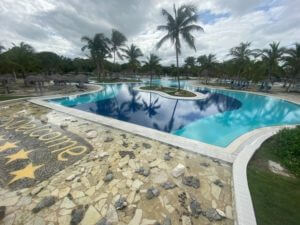 When we arrived to Playa Blanco, I was dismayed to find out it was a five-star resort. Even if the U.S. Department of Treasury allowed me to stay at this operation (all such large hotels are officially blacklisted by my government as they are owned by the Cuban government), I knew I would never wish to stay there. I whisked past the front guard and into the complex so I could at least eye the place, however. Here was a huge operation involving many shops, multiple and lavish pool areas, and restaurants. By the pool and on the beach were splayed the bodies of a few corpulent Europeans and other foreigners. “Playa Blanco” was appropriately named!
When we arrived to Playa Blanco, I was dismayed to find out it was a five-star resort. Even if the U.S. Department of Treasury allowed me to stay at this operation (all such large hotels are officially blacklisted by my government as they are owned by the Cuban government), I knew I would never wish to stay there. I whisked past the front guard and into the complex so I could at least eye the place, however. Here was a huge operation involving many shops, multiple and lavish pool areas, and restaurants. By the pool and on the beach were splayed the bodies of a few corpulent Europeans and other foreigners. “Playa Blanco” was appropriately named!
When I returned to Pedro’s car, I told him that I really wanted to see how the common people lived, and not to waste my money on a fancy room. He thought for a minute and decided to take me down the road about 15 km. to the village of Guardalavaca. Once we came to this area, however, I was again concerned, because he was planning to deposit me at a series of block apartments some kilometer away from the beach. He insisted I find an apartment right there, but I persisted. “I have a vision,” I lamented, and asked 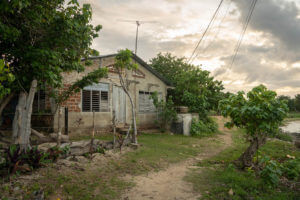 him to please continue on the road a way more, on a hunch. We turned on to a dirt road and came to a man who said there were some houses further on which might have a lodging for rent. And soon I saw what I had hoped for: three simple and rudimentary houses just a stone’s throw from undeveloped beaches. One of the houses was an official 𝘤𝘢𝘴𝘢 𝘱𝘢𝘳𝘵𝘪𝘤𝘶𝘭𝘢𝘳. I thanked Pedro for his incredible guidesmanship, patience, and compliance with my “inspiration,” then remunerated him in highly prized Euros I still had in my wallet – much more than he had asked for – and we parted with a promise to get together again when I returned to Holguín.
him to please continue on the road a way more, on a hunch. We turned on to a dirt road and came to a man who said there were some houses further on which might have a lodging for rent. And soon I saw what I had hoped for: three simple and rudimentary houses just a stone’s throw from undeveloped beaches. One of the houses was an official 𝘤𝘢𝘴𝘢 𝘱𝘢𝘳𝘵𝘪𝘤𝘶𝘭𝘢𝘳. I thanked Pedro for his incredible guidesmanship, patience, and compliance with my “inspiration,” then remunerated him in highly prized Euros I still had in my wallet – much more than he had asked for – and we parted with a promise to get together again when I returned to Holguín.
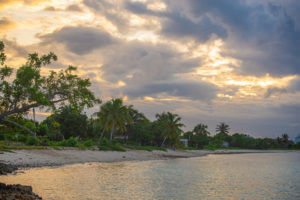 The lodging at which I found myself was very basic but had everything I needed, including a solid bed, toilet and shower, and a sort of door lock for security. The owners, Renaldo and Mirta (names changed for their protection), were in their early 60s and the woman seemed genuinely intrigued by my presence and passport. I asked her if any others from the USA had stayed there and she revealed that I was the first. I quickly changed into my swimming trunks, packed some water, finger bananas, and trail mix, retrieved my mask and snorkel, and headed away from the three houses, walking in my flip-flops over broken and exposed coral for some kilometer or more, as far away from civilization as I dared. The sky was matted with clouds and rain came and went. Eventually I found a welcome clearing, and carefully edged myself into the water, avoiding the razor-sharp edges of rocks. There was no one around and I could have been on my private island.
The lodging at which I found myself was very basic but had everything I needed, including a solid bed, toilet and shower, and a sort of door lock for security. The owners, Renaldo and Mirta (names changed for their protection), were in their early 60s and the woman seemed genuinely intrigued by my presence and passport. I asked her if any others from the USA had stayed there and she revealed that I was the first. I quickly changed into my swimming trunks, packed some water, finger bananas, and trail mix, retrieved my mask and snorkel, and headed away from the three houses, walking in my flip-flops over broken and exposed coral for some kilometer or more, as far away from civilization as I dared. The sky was matted with clouds and rain came and went. Eventually I found a welcome clearing, and carefully edged myself into the water, avoiding the razor-sharp edges of rocks. There was no one around and I could have been on my private island.
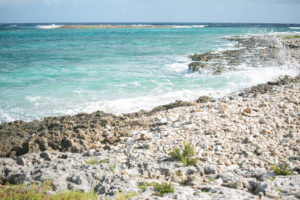 The water was clear, clean, refreshing, and lovely, and as I floated further away from the shore, I felt myself enter another world – one which I had experienced only two times in my life (Curaçao in 1980 and Kawaii in 1997). At first, I could not see any fish, but soon there were many…then hundreds below and around me. The tide seemed to be coming in and I could hear crashing waves on a more distant reef. Taking precautions to avoid any undertow and frequently noting my position relative to shore, I enjoyed a half-hour of entertainment courtesy of the ocean life. At one point a small but spectacular fish with a top-to-bottom spectrum of colors ranging from dark blue to bright yellow noticed me approach and hurriedly hid in a coral crevice. I waited for it to emerge and soon we played a sort of hide-and-seek for some minutes. At another point, I dove down some six feet to try to touch some in a school of thin, white fish, but they were naturally all too skittish.
The water was clear, clean, refreshing, and lovely, and as I floated further away from the shore, I felt myself enter another world – one which I had experienced only two times in my life (Curaçao in 1980 and Kawaii in 1997). At first, I could not see any fish, but soon there were many…then hundreds below and around me. The tide seemed to be coming in and I could hear crashing waves on a more distant reef. Taking precautions to avoid any undertow and frequently noting my position relative to shore, I enjoyed a half-hour of entertainment courtesy of the ocean life. At one point a small but spectacular fish with a top-to-bottom spectrum of colors ranging from dark blue to bright yellow noticed me approach and hurriedly hid in a coral crevice. I waited for it to emerge and soon we played a sort of hide-and-seek for some minutes. At another point, I dove down some six feet to try to touch some in a school of thin, white fish, but they were naturally all too skittish.
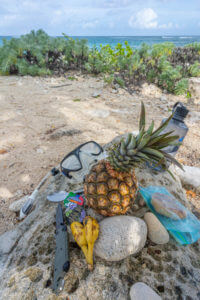 I didn’t want to stay in the ocean too long for my initial foray, planning to return the following morning. (Fortuitously, I had for the past two months revived my swimming strength to some degree by weekly visits to the local YMCA as I accompanied little D for her lessons at the pool.) I snacked on the little bananas and soaked in the scenery before returning to my temporary 𝘤𝘢𝘴𝘢 to take some photos of the setting sun and stand briefly in the company of a nearby tethered horse busy munching scrub grass. I was also able to distribute some of the toys and candy I had brought with me, to four youngsters living in an adjacent house.
I didn’t want to stay in the ocean too long for my initial foray, planning to return the following morning. (Fortuitously, I had for the past two months revived my swimming strength to some degree by weekly visits to the local YMCA as I accompanied little D for her lessons at the pool.) I snacked on the little bananas and soaked in the scenery before returning to my temporary 𝘤𝘢𝘴𝘢 to take some photos of the setting sun and stand briefly in the company of a nearby tethered horse busy munching scrub grass. I was also able to distribute some of the toys and candy I had brought with me, to four youngsters living in an adjacent house.
Older daughter D wrote me a few days ago, and inquired how I was feeling. I don’t know if this happiness, but living simply and with this unfolding adventure’s uncharted abandon for the past week, I realized I was feeling more relaxed than I have in perhaps a dozen years!
Pablo surprised me the next afternoon by appearing as I was packing to leave the beach. He offered to take me back to Holguín and the national’s bus station, so I accepted. I had asked a horse-drawn cart driver to take me a large local hotel so I could negotiate taxi fare at that point, but I wasn’t looking forward to such hassles in the heat of the day. Earlier I had returned to my special spot on the beach and enjoyed a morning of skin diving with the fish and carving up and eating a pineapple I had been carrying around for a couple of days. The water was roiled from the tide, so I saw fewer fish. I conducted a brief experiment to see if the fish were attracted to pineapple or some of my trail mix while I skin dove, but they were not.
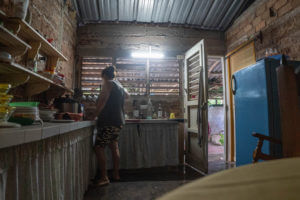 At breakfast, since we were all in the gloomy kitchen, I initiated a chat with the couple who owned the 𝘤𝘢𝘴𝘢 in which I was staying.
At breakfast, since we were all in the gloomy kitchen, I initiated a chat with the couple who owned the 𝘤𝘢𝘴𝘢 in which I was staying.
“Did you participate in a lot of patriotic events and parades when you were a teen?,” I asked.
“Yes, very emotional…it was very emotional,” Mirta answered. “The youth today don’t think the same way,” she added.
“They don’t have interest in participating in political activities?”
“No,” she said.
“So has life here improved here in the past decades?”
“No,” they both shook their heads. “And nowadays is the worst,” quipped Renaldo.
They agreed that some things had improved since the Revolution began, such as public services like electricity. But they complained about the high cost of living and lack of basic necessities. “There’s no shoes, no food,” said Mirta.
“What happened?” I asked.
“A monetary change,” she replied. Renaldo then began a long list of examples of how Cubans must use the black market and U.S. dollars to buy all but the rationed items. He complained a dollar now cost from 65 to 70 CUP and now in the market there was little to buy.
“There was a sudden change, very harsh…then the pandemic…everything got worse,” he said. “Even a little piece of bread costs 25 pesos,” he lamented.
“Does everyone have to participate in the black market? I wanted to know. “Everyone!” the answered in union.
“It’s not just a problem with the president–it’s a problem with the economy,” said Renaldo. “What would happen if the blockade were lifted?” I asked. “Everything would be completely improved,” he said. He pointed to the high cost of international shipping as a factor adding to the crisis.
“We blame the U.S. government, not the people,” said Renaldo, and he specifically called out one organization, what he called the Cuban-American Association. What he meant was the Cuban American National Foundation, founded in the early ‘80s. CANF was formerly a strong advocate for isolation of Cuba by the USA, but in 2009 it published an article calling for lifting U.S. restrictions on aid and travel to Cuba, and aiding civil society groups there. “Even third-party governments are now fined as part of the blockade!” Renaldo complained.
“It’s so cruel!” I opined. I suggested that when I returned to the USA, I would write an op-ed piece for a magazine or newspaper [which I did, in the magazine Fair Observer and the Orlando Sentinel], to exhort the lifting of the embargo and promote more tourism to Cuba, believing this would help the Cuban people. “I support the ideals of the [Cuban] revolution, which are equality, justice, patriotism, lifting the humble from poverty; but I don’t support the things I am seeing today, such as some Cuban elites living in mansions. “That’s inequality,” I said.
“There is always going to be inequality, different social classes; that’s normal,” Renaldo said. “But here those with family in the USA, who send remittances, that’s the difference here.”
Mirta spoke of how U.S. dollars were the only form of accepted payment for travel outside of Cuba.
“What’s the future for Cuba?” I asked. “Uncertain,” she said.
“It’s very difficult,” Renaldo added. “But we don’t want just anyone to come and tell us how to change; it’s for no one else than the Cubans to make changes,” he added. “We were never rich. But at least before we had food. It wasn’t a big thing before to buy milk, which is also now very costly and requires the black market.”
I tried to interject a positive tone by pointing out that lately the Cuban government made it easier for tourists to enter and lifted some of the COVID-19 restrictions.
“Well, let’s have the hope that things change,” said Renaldo.
Mirta told me of her children and grandchildren. “They are a concern,” she said. “Because here, where there is a birthday, we are accustomed to having a party and gifts. For example, my grandson needs a pair of shorts. But these are going to cost 1,000-1,200 pesos – which we simply don’t have.” Her eyes moistened at this point. “And in the stores there are no toys…there is nothing. For we two who are older, when we have a pair of shoes, we can keep these for the rest of our life. But for kids, their shoe sizes keep growing…”
“What a humanitarian disaster,” I glumly replied, scarcely holding back my own tears.
Later that day, I said adios to Renaldo and Mirta, gifting them with Euros enough for them to buy Christmas presents and then some…if anything were to be had in their area. Renaldo quickly grasped the money, so I wasn’t sure if he intended to tell Mirta how much it was.
The trip back to Holguín with Pablo took us through magnificent vistas in the setting sun and this time I positioned one of my bags in front of me in lieu of a seat belt – small comfort indeed. His girlfriend, a freelance makeup artist, accompanied us. They told me they had met earlier this year while both waited on a line to buy milk. We headed due West, into the brilliant light, and I was glad I had packed a pair of sunglasses. We arrived to a hotel where I was supposed to catch a bus to Santiago, another city further to the East. But after some two hours of waiting, the bus never showed up. I decided I would go back to the Holguín 𝘤𝘢𝘴𝘢 I had stayed in earlier in the week, and that the next day I would return to Havana, to replenish my stock of food stuffs. Fortunately, there was a free room and I rested well, in spite of a gnawing hunger barely offset by some French fries and a slice of bread I had miraculously found at a hotel restaurant – the only food available or which I could eat there.
My health and energy level are fine, although I estimate I am getting just about 1,000 calories each day. One unexpected result of my reduced diet has been a series of very vivid dreams the past three nights, one of which I played a role in preventing an office building from burning but then got involved in some political gambit; and another in which I unsuccessfully hid under a table from little D, who was wiser than me and knew it. Today I noticed a gash I had on my left arm was looking worryingly infected, and I hurried to apply some ointment and bandage it up before heading out to buy my bus ticket.
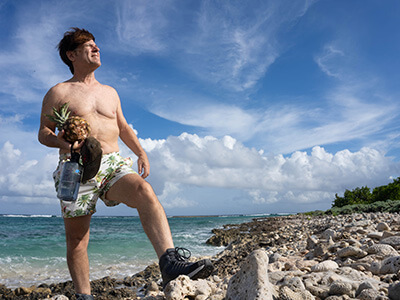
0 Comments